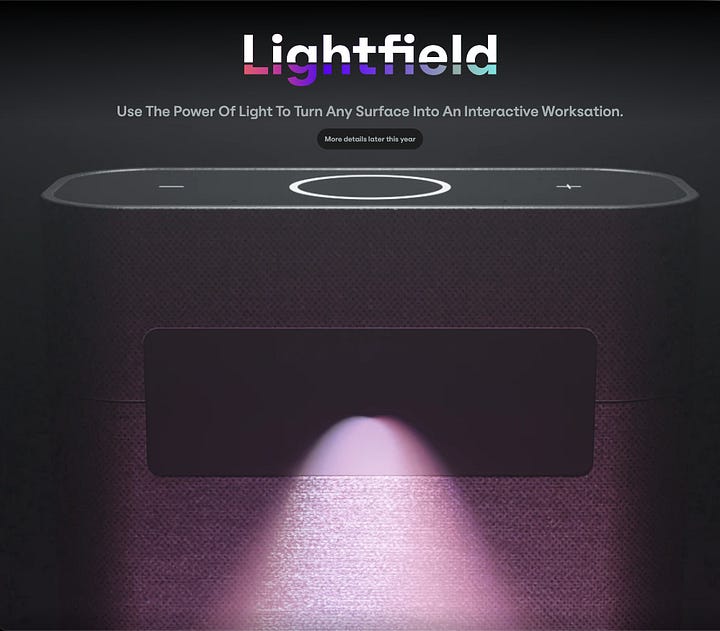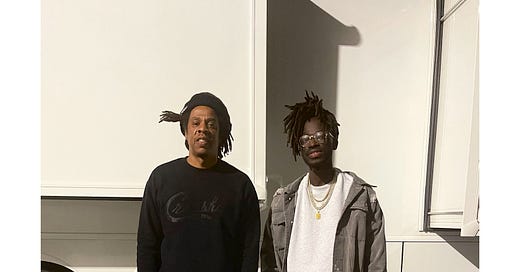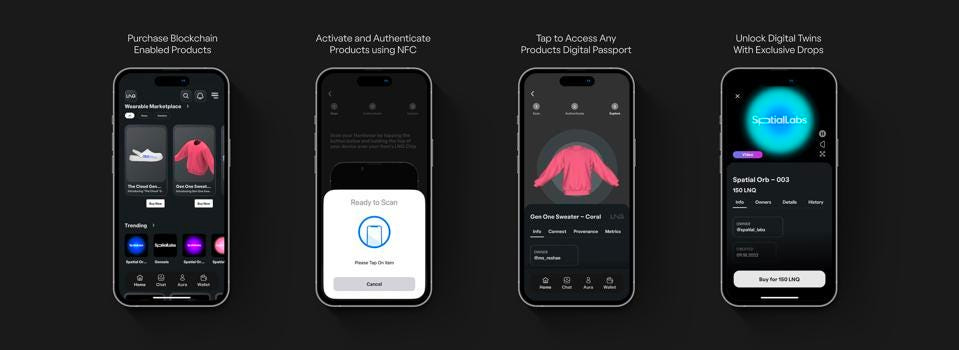Why did Jay-Z Back Up this Ghanaian Tech Company ?
A revolutional technology led by Ghanaian-American entrepreneur Iddris Sandu
Since the breakout of Covid in 2020 and the world being forced to stay indoors, we certainly all have been involved and have heard about Web3. But, what is it, really? How does it impact online users? And how can Tech companies make it the next Big Thing? We will answer these questions by first giving more context to the different generations of the Web and showcasing the fresh, unique and innovative work of Web3 company called Spatial Labs.
In a nutshell, Web3 refers to the latest generation of the internet. It is a fairly new technology that aims to decentralize data, giving users greater control and ownership over their digital identity. The first generation of the World Wide Web, Web1, lasted from 1994 to 2004 and was entered around static web pages allowing users to only read data without being able to interact with it in a meaningful way. However, it paved the way for the internet as we know it today and set the foundations of web design and development. Despite being outdated and primitive, Web1 marked an influential chapter in the history of the web and allowed early internet adopters to shape the way we share information online today.
With the introduction of Web2 in 2004, more complex, more sophisticated and more interactive websites could be built. This new iteration of the internet opened the door for new technologies and opened up a new era for social media platforms and content sharing across the internet. In fact, it allowed users to create content online in various forms such as videos, pictures, podcasts, blogs, wikis and online communities. This led to the increase in popularity and easier adoption of web applications running on browsers and smartphones. Facebook, Youtube, Instagram, Wikipedia and Twitter are Web2 platforms letting users interact among each other, express their opinions, learn new things and be entertained online. Web2 has also made businesses reach more customers and offer them personalized services possible. However, this second version of the internet is centralized and only controlled by Big Tech companies that collect users’ personal data and sell them to advertisers. This results in users having small control over their own data.
The term “Web3” has first been heard in 2014 and represents the new generation of the internet aiming to address some of these issues Web2 has. Web3 is backed by blockchain technology, a way of storing and sharing information publicly and safely. It is like a book recording everything that happens on a network of computer systems. Each page of the book is a block, each block contains a list of events that happened on the network. For instance, I can send or receive money using blockchain and it will be recorded on a block. These transactions cannot be changed or fake thanks to algorithms and math which makes blockchain a trustworthy and transparent technology. It can be used for many other things such as games, votes, and cryptocurrencies, to store patient medical records, to increase trust with contracts and more. With this technology, Web3 aims to decentralize the data so that users can own their own and have control over it without going through a middleman in a safe way. Thanks to the records of the blockchain you can have more details and analytics about your data, more than what Web2 platforms would provide you.
Now that we know what Web3 and its benefits are, we can dive into one of its most creative, visionary and innovative players. Spatial Labs. It is a Web3 infrastructure firm, founded in 2021 by Ghanaian Tech head Iddris Sandu, focused on creating a decentralized platform for fashion and culture. The 25-year-old Ghanaian tech entrepreneur has collaborated with many important figures of Hip Hop including Kanye West, Pharrell Williams and Jay-Z. He is known for his work in creating the Marathon Store, the first smart clothing store in collaboration with the Late rapper Nipsey Hussle while only 19. His interest in technology started at 11 after he watched the 2007 presentation of the first iPhone by one of the most creative minds, Steve Jobs. This led him to learn programming at a very young age, making him unique compared to other kids of the same age. As a teenager, he also interned and consulted for Tech giants like Google, Facebook, Instagram, Twitter, Snapchat and Uber. These unparalleled achievements can only cement how much of a genius he is. Later on, he collaborated with more big names and prestigious brands of different creative industries such as Virgil Abloh, Snoop Dog, Jaden Smith, Fenty, Prada, and adidas, just to name a few. His genius and aspirations don’t stop with tech only. He is a unicorn with a nerdy background willing to merge technology and culture together. Being multifaceted allowed him to work on different inventive and creative projects with all these brands. At 25, he still aims to impact the very competitive tech industry in spaces like AR or augmented reality and Web3 and also the complex fashion industry.
This visionary Ghanian, based in Los Angeles, focuses his energy on building what he calls the next Gen Z-founded Unicorn, Spatial Labs. In the like of Apple which made technology cool and products more relatable to the everyday person through the iPhone, iPad and Mac, Spatial Labs aspire to increase the adoption of Web3 and change the way we consume and create online. As of late, the company have recently announced a $10 million seed funding round led by Blockchain Capital, a venture firm that invests in blockchain technology companies. Marcy Venture Partners, a fund co-founded by Jay-Z, also participated in that round, bringing Spatial Labs’ total funding to $14 million. In October 2022 the company launched LNQ, a decentralized marketplace aiming to redefine consumer commerce and ownership of products.
What makes the marketplace special is that items listed on the platform embed the LNQ One Chip, allowing blockchain capabilities. Spatial Labs built this small piece of material the size of a coin with an electronic circuit on it to integrate it into physical products giving information on authentication and transparency on product lifecycles to buyers and sellers. In May 2021, alongside the LNQ One chip, the Los Angeles-based company launched their “hardwear” line. It is a play of words with “hardware” and “wear”. Hardware refers to the physical and electronic parts of a device or a computer such as wires, chips, computers, and screens.
The line includes the Gen One Sweater and the Cloud Gen One Clog. Mixing tech and fashion is nothing but it has never been executed this efficiently and in such an intuitive way. When you buy some tech products, wether it is a smartphone, a camera, a computer or even a smartwatch, having to charge it still remains annoying and inconvenient. These hardwears don’t need to be charged at all. Iddris and his team fixes an issue that is worth being implemented in more devices.
In fact, these hardwear products provide users access to real-life events and enable payment capabilities. Moreover, you can track ownership and track the location of the item. Tapping the LNQ chip with a phone allows the user to see the virtual equivalent of the piece and the data linked to it. Tapping someone else’s LNQ chip will show links to his social media handles and websites the person previously set.
With these life-changing releases, Spatial Labs showcases a different approach than any other company in the Web3 space and in the tech space in general at the moment. Using clothing to experience technology in a more playful and seamless way shows that the physical world could be used as the main platform. So, you cannot be distracted by it because it blends into the background.
Rather than solely focusing on software, which is the set of instructions that tells hardware what to do, and virtual experiences, they stress the importance of hardware as entry points.
Hardwear creates a real-world utility and will increase the adoption of Web3 and emerging technologies coming along. Iddris’ futuristic vision is rooted in the metaverse. He qualifies the Spatial Labs ecosystem of products as the “Metaverse of Things”, referring to the wearable internet. This new way of experiencing will start making more sense to the consumers as new products and projects have been teased on their website. Augmented Reality is also part of their focus and we can expect more in the coming future.


After receiving funds in January 2023, Spatial Labs will use this money to expand their office, and team to develop their platform even further. The focus is on creating solutions for brands and creators willing to leverage web3 technologies. Despite Web3 being in its early stages of development and facing many challenges such as scalability, usability, regulation and adoption, the company and its founder have the potential to be a prominent player in that space and the fashion world as well.
By the way, do you know what else is bringing Web3 to the culture? STEELO! We also intend on revolutionizing the way we consume fashion and culture. In recent times, we offer our community an exclusive look into the fashion, music and creative industry. Join our Discord community here.
You can check Spatials Labs’ web page out here.










🚀🚀🚀
👏🏽👏🏽👏🏽🙌🏽